Across 2016, ostensibly legitimate journalists and research firms gravely warned that Apple was in trouble on every front— from low cost wearables to Microsoft's 2-in-1 notebooks, to Google's new Pixel Phone and a resurgent Samsung— as well as falling behind everyone else in the emerging, very promising field of Virtual Reality. They were all so incredibly wrong we can now have a good end-of-year laugh at their expense.
Take a gander at the goose in Apple's sauce
There are two measurements of success in the tech industry: one is applied to Apple, where expectations are stratospherically high and failure is always anticipated.
The other is applied to Apple's competitors, where expectations are so low that even a tremendous, embarrassing flop can be written off as a "valuable learning experience" (Google Glass) and every new failure rudely blindsides perpetually optimistic observers (Google Pixel: who could have guessed it wouldn't sell in significant volumes!? At least it was a valuable learning experience).
At the beginning of this year, AppleInsider published "Apple's competition is going to have a tough year in 2016", examining the question of whether Apple even faces any effective competition anymore.
Throughout the year a variety of critics worked hard to invent competition for Apple. But no amount of advocacy or propaganda has shifted the reality that's readily apparent.
Entering 2016, Apple earned virtually all of the profits in smartphones, in tablets, in PCs and had introduced the only successful smartwatch— capable of not just stomping out Android Wear and Samsung Tizen as competitors but also taking a large bite out of premium Suisse watch sales— even as its rivals struggled in every product category.
What changed this year? Apple's weak competitors lost more ground and suffered more failures, setting Apple up against an even weaker competitive threat in 2017.
Profits build offensive infrastructure
At the same time, while Apple is now amassing incredible piles of resources (now above $237 billion) and is returning $2 billion to shareholders each quarter, it's also investing tremendously in a proprietary software development (including macOS, iOS, tvOS, watchOS; the Continuity and iCloud glue that bind them together and its new Swift language and the development tools that power third party apps).
It's also investing billions in supply chain capacity, materials, operations and technology. And in parallel, it's building billions of dollars worth of new facilities, including its Campus 2 research and development offices in Cupertino and a global collection of other sites focused on software development, health technology, Maps, machine learning, silicon logic and other specialties.
While pundits keep asking simplistic questions about where Apple's next big i-device is, the reality is that we already have an ultra-mobile personal computer in iPhone, and mobile professional computer in iPad Pro, and conventional Macs. Apple doesn't need to introduce another device category as much as it needs to maintain and advance what it already sells.
Discussing mobile now is like discussing PCs in 2000. The important questions are about what we can build with this, and what we build next
— Benedict Evans (@BenedictEvans) December 31, 2016
Microsoft wasn't expected to introduce a new OS every few years. Google wasn't tasked with creating a new search engine over and over again and HP and Dell churned out conventional PCs for many years without facing interrogation about the "next PC" replacement.
Apple's silicon secrets
What drove much of the forward progress of the tech industry in the 1990s and 2000s was actually Intel's processors, continually upgrading PCs, servers and the software they ran.
Today, Apple is actually hampered by Intel's slower chip advancements in releasing new Macs. But in the iOS world, Apple has not only outpaced the industry in mobile Application Processors, but has also taken over ownership of the cream in mobile silicon.Apple has not only outpaced the industry in mobile Application Processors, but has also taken over ownership of the cream in mobile silicon
It's done so by earning money on advanced chips and aggressively reinvesting that into further development.
When Apple first worked on the Newton Message Pad in the early 1990s, it had to invest in developing the ARM Architecture as a new mobile processor.
But it wasn't making enough money on hardware sales to rapidly and perpetually advance ARM chip development on its own. The rest of the industry, notably Nokia, began investing money into ARM chips and made them ubiquitous in phones. When Apple returned to ARM chips with iPod in 2001, they had become cheap and power efficient.
Apple spent billions investing more money into commodity ARM chip orders until the late 2000s, when it began doing custom design of its own ARM cores. Apple has not only radically advanced the state of the art, but has done so on a scale that nobody else can match.
No other phone or tablet maker sells anywhere near as many premium, powerful devices as Apple. That greatly reduces the potential for Google, a Chinese startup, or even Samsung to build a true competitor to iPhones or iPad at a similar cost structure. The chips used by Google's Pixel, for example, feature cores that are only half as fast as Apple's A10 Fusion.
And despite various attempts by Google, Microsoft and others to dumb down smartphones into less powerful devices using simpler chips at a lower cost, Apple has proven that a lucrative demand exists for very powerful smartphones capable of advanced processing features— notably including sophisticated camera imaging and secure biometrics for authentication and Apple Pay.
Across 2014, pundits and analysts were castigating Apple for not building a cheaper iPhone. Apple did eventually repackage iPhone 5 to resell it as iPhone 5c, and this was successful (despite many false reports maintaining that is wasn't). However, in the years since, Apple's own sales data has made it clear that it could perform better by focusing on more advanced and expensive models rather than cheaper repackaging.
In 2015 Apple launched iPhone 6 alongside its most expensive ever iPhone 6 Plus. Next year, Apple is rumored to be adding an even more premium option to woo high end buyers.
In direct contrast to the popular narrative of cheap commodity erasing Apple's Mac and iOS businesses, the reality is that Apple is increasingly becoming more difficult to compete against as it builds its own sophisticated custom silicon and refines its incrementally expanding software platforms.
While Apple keeps advancing its state of the art in core technologies, consider what its rivals have been doing in 2016.
Samsung's smoke screen of excessive innovation
Samsung— after just beginning to recover to its 2014-level revenues after being clobbered by iPhone 6 & 6 Plus and then batted back down again by iPhone 6s an 6s Plus— rushed to market a poorly designed fablet flagship that was so dangerously prone to burst into flames that airports, metro stations and even cruise ships banned its possession on their vehicles. It was undoubtably the worst and most expensive recall to ever occur in tech.
However, Samsung's fiery Note 7 conflagration was coached by the media as being a problem of the Korean conglomerate having "packed it with so much innovation" that, well, flames ensued. That ridiculous quote was actually set into type for the New York Times by Brian X. Chen and Choe Sang-Hun.
Remember when these writers excused iPhone 4 signal attenuation as a problem with Apple "packing too much innovation" into its products? No, because they didn't. They reviled Apple's innovation and branded it as an inexcusable failure because it might drop a call if you hold it wrong— versus bursting into flames no matter how it's being held.
Packed with so much innovation it naturally burnsWriting for the Wall Street Journal, Geoffrey A. Fowler and Joanna Stern insisted that while Samsung's defective design of the Note 7 carried a clear risk for fire and should be powered down and returned immediately, "there's no reason to believe other Samsung models are dangerous," shortly before citing an anecdotal story of an iPhone 7 that was also said to have caught fire in a posting on Reddit, a false equivalency of the highest order.
There's no evidence, anywhere, that iPhone 7 has an inherently flawed design that results in fire. If it did, there'd be many scores of reports, not a single photo posted to a site that provides an audience to the GamerGate and AltRight fringe— because Apple ships many times more premium iPhones compared to Samsung's Galaxy Note. There are, however, a variety of reports of other Samsung models catching fire (such as the Galaxy J5). But let's move past the selective reporting of facts by Fowler and Stern, because I don't have all day.
Pay no attention the fire behind the curtain
Note instead that after Samsung released millions of dangerous Galaxy phones, then bungled its recall, handed out new batches of equally defective replacements, then pulled its 2016 Note 7 flagship entirely, reporters and research groups fell all over themselves to "report" that Samsung's explosive launch would have absolutely no impact on buyers' behavior going forward and virtually no impact on its brand.
Incredibly, CNBC and Reuters collaborated to spread the results of a single internal poll that insisted the "Galaxy Note 7 recall did not damage Samsung brand in U.S."
That poll was necessary to conduct and report because earlier, independent polls had reported that 34 percent, and later 40 percent, of current Samsung owners said that in the wake of the recall that they wouldn't buy another Samsung phone. Of those leaving the brand, 30 percent said they planned to switch to an iPhone.
With scathing results like that, why would news organizations with a clear bias against Apple feel the need to create their own data to refute the findings that exist on Apple's primary competitor, not to mention obvious reality? And why would they exclusively report only their own mind-bending findings? Also, what sort of data might they be able to create assuring the public of the safety of lead, asbestos, cigarette smoking and coal pollution?
More recently, NPD similarly issued a report suggesting that Samsung's Note 7 fiasco had no apparent impact on U.S. phone sales for the company, based on sales data.
However, it didn't quantify how much of this was attributable to Samsung offering generous cash handouts and other promotions, a very real expense necessitated by Galaxy Note 7 fires. However, it apparently remains necessary to exonerate Samsung because apart from that company, Apple has no real competition at all among smartphones that sell at a sustainable profit.
And a sustainable profit is one where real money is made, not just fake numbers like those that were reported by the Wall Street Journal in an article suggesting that China's Xiaomi was actually showing positive signs of potential profitability
Apple premium sales volumes lower than total global production of cheap devices!
Samsung is the only company apart from Apple that earns any significant profits from its smartphone sales, due almost entirely to its premium-priced Galaxy flagship models. With the primary competitor to Apple's iPhone literally on fire and pulled from the market, the only way to continue to marginalize Apple's phone business would be compare iPhone sales against volumes of low end phones shipped into developing countries. Done!
That's the same strategy IDC likes to use in marginalizing Apple Watch sales. Except that IDC can't even compare its Apple Watch estimates against other smartwatches, because that's not flattering to anyone but Apple. Instead, it has to compare $300 to $1,000 and up Apple Watch sales against Fitbit's fitness trackers with an average selling price of around $88 and Xiaomi's $13-25 fitness bands.
In 2015, Apple stopped detailing sales volumes of iPods, Apple Watch, and other hardware, including the new AirPods. That's allowed critics to claim that Apple might be hiding its failures, an idea that isn't often applied to Amazon, Google, Microsoft or even Samsung, none of which document their own sales of bands, tablets or even phones.
Selective scrutiny, broad credulity
When Apple's chief executive Tim Cook noted that AirPods are "a runaway success" and that the company is "making them just as fast as we can" to meet demand, The Verge announced in its headline "that means nothing without numbers."
What a curious, egregious double-standard in framing events from a site that celebrates Bezos graph scales, Amazon's meaningless sales chart rankings, Microsoft's perpetual claims of "sold out" inventories, and Samsung's "quite smooth" numberless smoke signals of suggested successes.
Coincidentally, just days before skeptically suggesting Cook was lying about the popularity of AirPods, The Verge printed a Microsoft press release that claimed Mac users were rushing to buy a Surface. Rather than insisting that the claim "means nothing without numbers," Tom Warren nodded along with Microsoft's Surface advertisements, writing that they "might be paying off."
Warren wrote, "Microsoft still isn't providing sales numbers, but the company claims 'more people are switching from Macs to Surface than ever before,'" then repeated, "Again, Microsoft refuses to provide numbers but vaguely claims 'our trade-in program for MacBooks was our best ever.'"
Microsoft's Surface headline on The Verge expresses no skepticism of the the idea that significant numbers of MacBook Pro buyers are actually so disappointed in Apple that they are rushing out to those notoriously vacant Microsoft retail stores to snatch up its breathtakingly expensive Windows 10 PCs, but the site offers no similar level of credulity in the possibility that Apple's AirPods might be popular, even given the fact that Apple, an experienced high volume manufacturer, has stock-outs into January on a product it desperately wants to sell, not just advertise as a success.
Pathetic Pixel, Stagnant Surface
Perhaps writers at The Verge are just still really upset because they know that the site will have to write a new excuse for why Google's latest "Nexus," rebranded Pixel, failed to garner any real attention among buyers despite the website's valiant efforts to incessantly promote the device on behalf of Google.
Or alternatively, perhaps it's disappointed that its parallel promotion of Microsoft's Surface has been similarly ineffectual. The pricey, "Sleep of Death" premium notebooks, hybrid tablets and convertible desktops have had more praise heaped on them than a Millennial, but that still isn't resulting in total sales reaching above the $1 billion quarterly ceiling they've bumped up against for the last several years.
Before Microsoft got into hardware, all the tech media could talk about was how Apple's overall business model was doomed because of cheap commodity PCs. But now, Microsoft is supposedly going to be saved by innovative hardware designs and proprietary gadgets. Why? There's much less differentiation between a Microsoft branded PC and any other Windows PC running the same software.
Google was similarly credited with having erected a commodity platform in Android that Apple supposedly wouldn't be able to compete against, or even keep up with in terms of innovation. Those stories proved to be entirely false, but now Google's own hardware is being described as able to stand out and compete against the that same bulk of cheap Android commodity. Why?
Apple sells many times more notebooks, phones and tablets every quarter that either of its premium-commodity rivals, but the company is also tasked with not just remaining in the lead, but also bettering its own sales volumes each year by a margin greater than most of its competitors' total sales: another double standard.
Imagine a runner expected to not only beat everyone else in the race, but also beat their own best time, every time, while being derided as having a boring running style and failing to invent new ways to run each time they race. Meanwhile, everyone else gets a trophy just for showing up.
Virtual reality journalism
Journalists are supposed to report what's happening, not invent a narrative they want to happen. The problem is that few modern tech writers are actually journalists. Many are casual bloggers from vendor advocacy sites with a grudge against Apple.Journalists are supposed to report what's happening, not invent a narrative they want to happen
The New York Times hired Brian X. Chen despite his history in inventing quotations and attributing them to others for Wired, in an apparent attempt to instantiate his own desired reality (most famously, that Japan "hated" the iPhone).
The Wall Street Journal hired blogger Joanna Stern from a background at The Verge and Engadget, both of which desperately advocated Android ideology despite the software's technical failings, Google's poor management and maintenance of it, and its ultimate failure to be anything other than a "toxic hellstew" of a platform for also-ran hardware companies lacking the resources to maintain their own platform.
Bloomberg hired a rumor leaks blogger Mark Gurman to report hard news on Apple, after he scored such "exclusive reports" as the 2015 claim that the next Apple Watch would feature a camera and handle FaceTime calls (but not GPS!) and could be made from titanium, tungsten, palladium and platinum (but not ceramic!).
The FaceTime idea made no sense to anyone familiar with watchOS or even Apple's developer guidelines that outlined its "glanceable" UI as targeting a few seconds of interaction, rather than sustained video calls.
Tiny video calls of far poorer quality than the display on the phone you'd actually be using to handle the call anyway really made zero sense on any level. Essentially every other part of his report was also wrong. Yet this report was hailed for a year as being the definitive road map for Apple Watch, until everyone just forgot that everything they'd been told was completely wrong, made up guesswork.
And yet today, the majority of the most viral headlines about Apple are crafted by these same bloggers, now at major news outlets and claiming to know lots of details about what Apple is actually doing in automotive and other areas where far less is actually known compared to Apple Watch. These same figures collectively predicted that iPhone 7 would be boring, when all signs clearly pointed to major advances.
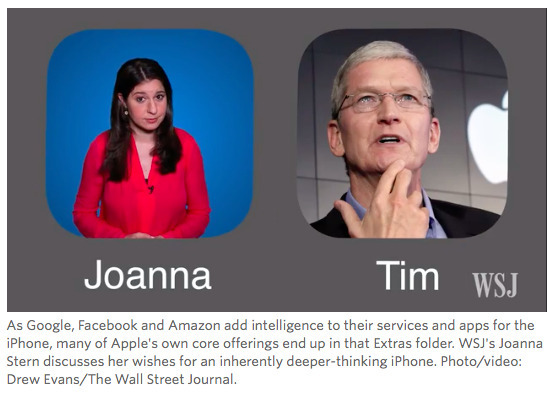 Apple's Tim Cook gets blogsplained in how to run a global enterprise by a person who reviews tech products
Apple's Tim Cook gets blogsplained in how to run a global enterprise by a person who reviews tech products Tech media writers can invent attributions, stage false equivalencies and present made-up product rumors and channel checks as credible facts and get away with it, because nobody calls to mind their reports once they've collect all the clicks they can.
These fast-and-loose reporters are undermining their own credibility and the legitimacy of the media in general. They seem to feel entitled to continue without concern, because Apple is unlikely to correct them out of regard for its own secrecy. But how many times can you report that Apple is failing when it clearly isn't true?
It's hard to think of a better example of 2016's virtual reality in tech journalism than VR itself, which was hyped into a frenzy and used as a data point showing how Apple was falling behind and failing to meaningfully contribute to the important and imminently commercially-relevant business— right up to the point where VR was ultimately deemed toward the end of the year as being "the biggest loser" of the holiday season.
Post holiday sales data confirming our holiday buying study that bluetooth headphones (general category) were the big winner this holiday.
— Ben Bajarin (@BenBajarin) December 31, 2016
The biggest actual winner so far this holiday season? Bluetooth headphones. That comes after Apple was derided for buying Beats, which now leads in Bluetooth headphones. That acquisition also set Apple up to leverage its silicon prowess to develop its custom W1 chip and release its own AirPods, which appear to be a hit.
While VR remained the "biggest loser" Bluetooth headphones were a holiday hitAfter so many years of preaching PC Commodity, Android Ascendancy, Tablet Media Consumption Theory, Global Device Volume Market Share, and a basket of other propaganda tactics designed to aggrandize everything outside of the most successful and competent hardware maker, perhaps 2017 is the year for tech journalists to stop trying to effect ideological change and more honestly begin to report reality.
 Daniel Eran Dilger
Daniel Eran Dilger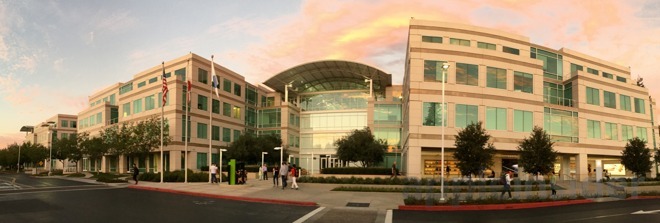
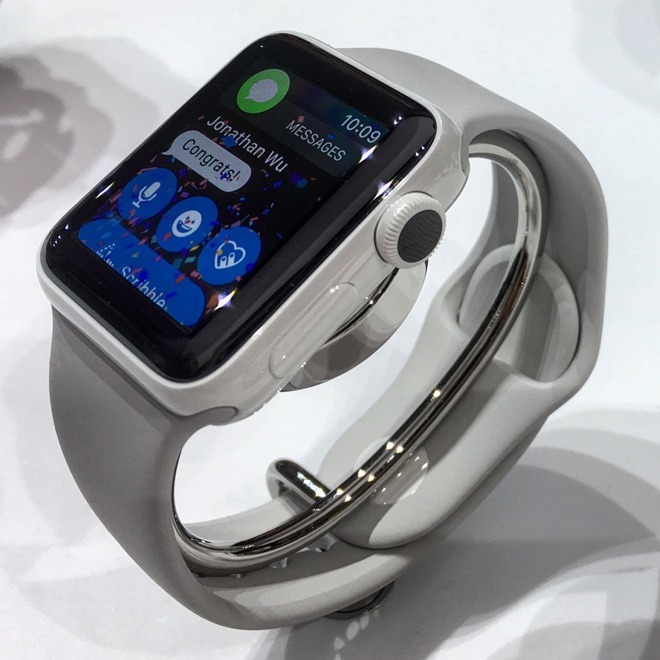
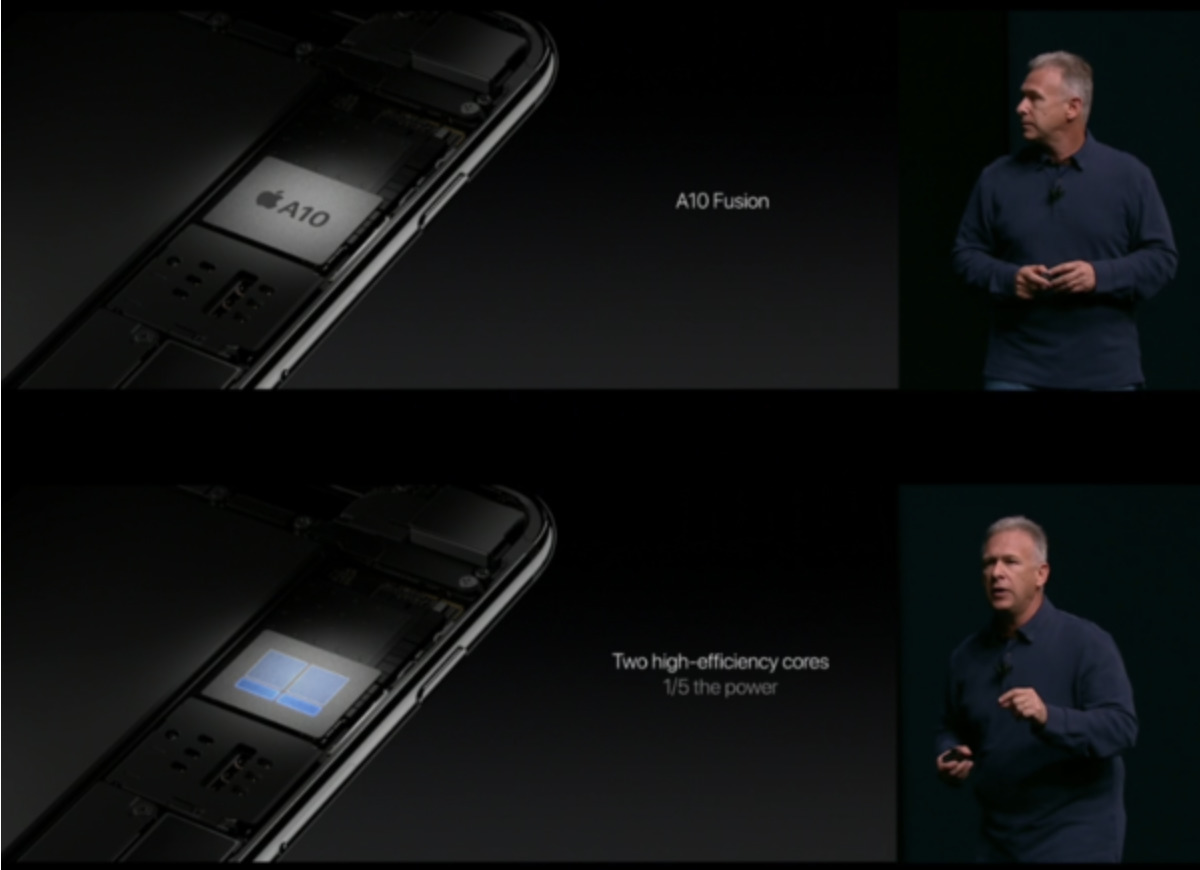
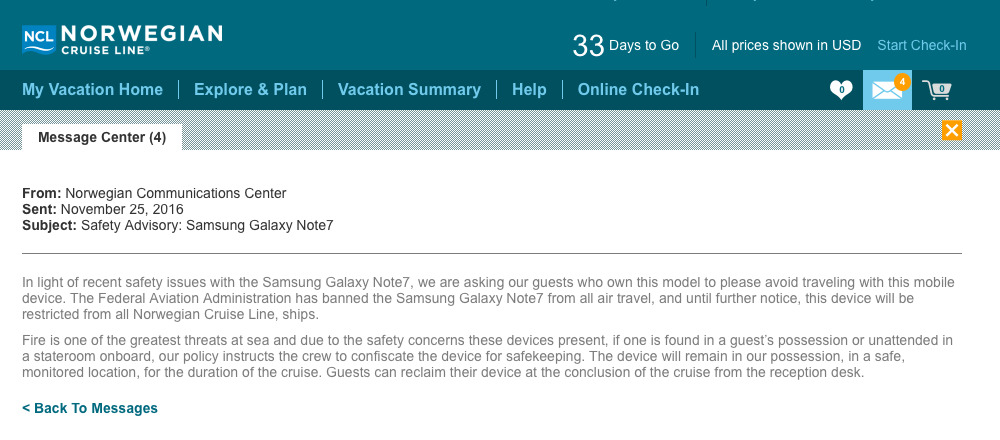

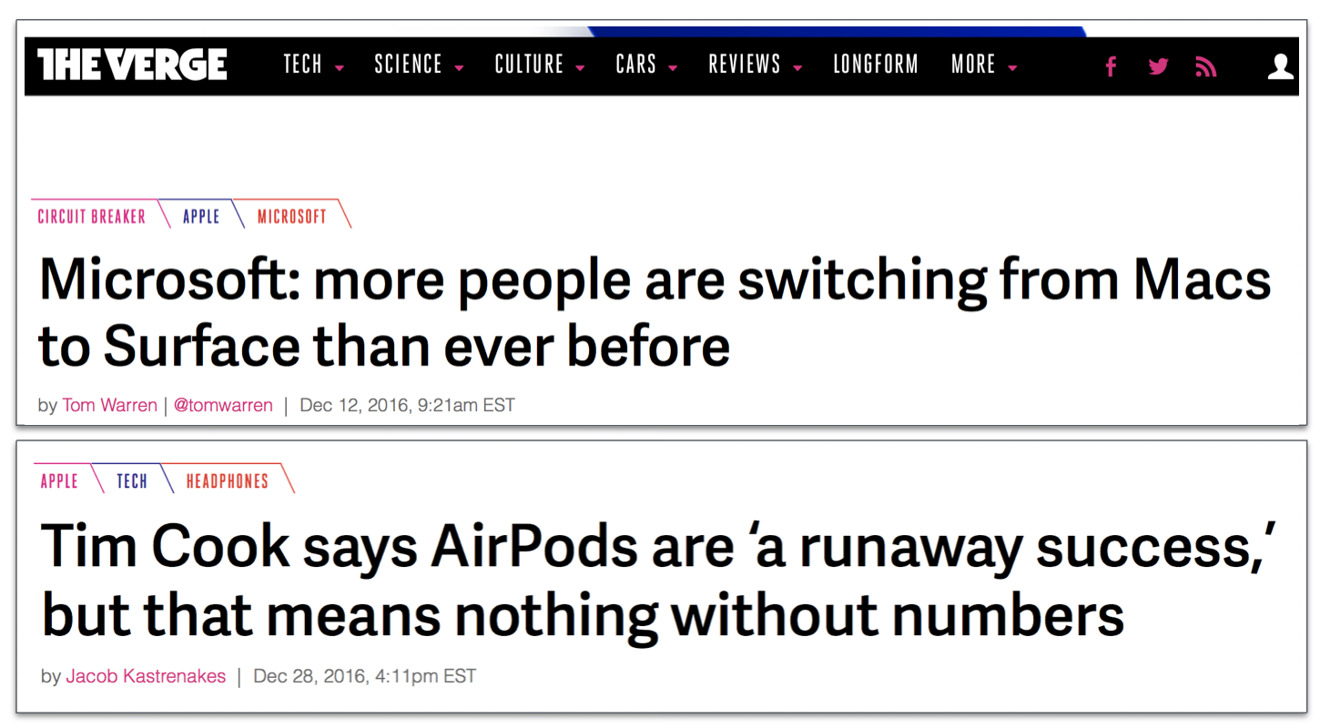







-m.jpg)






 Brian Patterson
Brian Patterson
 Charles Martin
Charles Martin


 Malcolm Owen
Malcolm Owen
 William Gallagher
William Gallagher
 Christine McKee
Christine McKee
 Marko Zivkovic
Marko Zivkovic









85 Comments
man...
Disagree about now being the time to focus on maintaining. Apple right now needs to avoid becoming Microsoft circa 1999; dominant and yet headed for a lost decade. Things look okay right now, but that can change quickly.
we might as well add Walt Mossberg to that list... this old fart who used to be Steve's lap dog regards himself as Steve Job nowadays.
"
Oh come on, where's the fun in that!
Excellent article, as always, from DED.